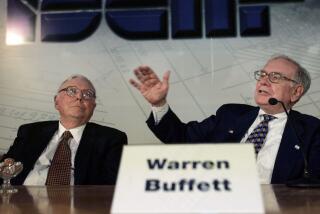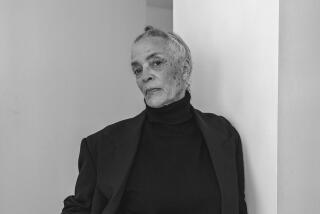USC Benefactor: One in a Million : Endowment: Merle Bensinger and his desire to share survived an orphanage upbringing, cerebral palsy, discrimination and the struggle for an education.
SACRAMENTO — Merle Bensinger is sitting in a motorized armchair in his Sacramento home, talking about an extraordinary subject--his life.
There is his childhood spent in a Dickensian orphanage in the 20th-Century Midwest; Tom Sawyer-esque flights; episodes of riding freight trains and punching out bullies; marriage, divorce and a child; a 42-year career as a psychologist; and, this fall, a rare, million-dollar endowment of a professorship at the USC’s Ethel Percy Andrus Gerontology Center.
Threading through the erratic drama is the fact that since birth Bensinger has had cerebral palsy.
In noted autobiographical works, writers with cerebral palsy have driven home the point that they are as cantankerous, randy, talented and complex as the able-bodied.
Daniel Day-Lewis swilled and slugged through last year’s Academy-Award-winning portrayal of Irish writer Christy Brown in the film, “My Left Foot,” drawn largely from Brown’s book “Down All the Days.” In Britain’s award-winning novel “Under the Eye of the Clock,” the severely handicapped writer, Christopher Nolan, calls his principal character “crippled” not disabled, and candidly describes his physical limitations.
So, too, Bensinger describes the vicissitudes of his 71 years without burdening his story with morals or messages. His narration is blunt and brisk, recounted in a voice so purposeful his words could be blown out from a bellows.
Occasionally, as he stops to draw a drink through a straw, an errant spasm betrays his faulty muscle coordination. He holds out his right hand, showing how his fingers uncontrollably clench, and rests his feet, bare from his morning’s whirlpool session, on the floor. Walking has always been a problematic means of locomotion. A nearby snapshot shows Bensinger standing outdoors, his arms outspread for balance like the wings of an airplane in a sharply banking turn.
Keen-eyed and grizzled, he is an outdoors-lover who rides his wheelchair into the back yard of his suburban ranch-style house, supervising the weeding of his vegetable garden and pruning his roses.
“He drives us hard, the same way he drives himself,” says June Knedel, who has served as his secretary and factotum for 28 years.
In the beginning, however, Bensinger had no motivating force, not even a family name he could count on.
“My mother had me in a foundling home,” he explains. “She went across the river. My father and she weren’t married. They had three children. She had to adopt us out.”
Hiding the shame of her pregnancy, his mother left her Kentucky home to live in Evansville, Ind., where she worked in a cigar-wrapping factory until her son was born in April 1919.
When he was 6 months old, Bensinger was adopted “the first time,” he says. But his adoptive mother, Sara Biery, developed tuberculosis, and her husband, a mechanic for the Franklin motor car, deserted her. Bensinger was again put up for adoption, this time in the Knox County Orphanage in Vincennes, Ind. After six months he was claimed, this second time by Commodore and Leona Bensinger. Bensinger worked in a restaurant by day and by night labored in the coal mines outside Vincennes. But in less than a year, this second home fell apart when Leona Bensinger ran off with a traveling salesman.
His adoptive father was taking care of both Bensinger and a little girl the family had also taken in.
“I remember he would leave me in bed and hold me until I fell asleep because I was afraid of being alone,” Bensinger recalls of these moments when he was less than 2 years old. Later his adoptive father was obliged to board the children out; but “he said people would mistreat us, so he put us back in the orphanage.”
At the time Bensinger was not yet 3 years old.
“He could only visit one day a month, the last Thursday. He’d bring me candy and cowboy suits.
“I used to cry a lot for my father because he was the only person alive I knew.”
His adoptive father did not understand why spasms coursed through his son’s muscles or why he could not walk. “He didn’t know I had cerebral palsy and neither did Aunt Sara, my first adopted mother. They didn’t know what cerebral palsy was back in those days. They thought I had polio.”
As a youngster, Bensinger was pulled to school in a wagon by his classmates. When he was 6, he underwent experimental surgery to help him walk. Nerves connected to his inner thigh muscles were severed, and for almost a year he lay with his legs strapped up on each side of his bed. “I could see these little kids up on a hill playing with their goats and their dogs and I thought, ‘Oh, when I get back to the orphanage and put my bare feet in the sand and dirt, I’ll feel so good.’ ”
Bensinger returned to the orphanage with a cowboy gait, swinging out his hips as he moved. Still, by the seventh grade he was covering the mile to school by himself. “I’d run and fall and run and fall,” he says. One day he was arrested by a police officer who mistakenly believed he was drunk. The orphanage was not a place that coddled cripples, and Bensinger was a lightning rod for bullies on the playground. Holding onto the iron fence that surrounded the schoolyard, he would slug them back. “I’d get bloody noses and black eyes. Then the other kids would join in. But I always had to be punished first.”
When he was about 13 years old, Bensinger ran away with two other boys. “We wanted to go down the Wabash River into the Ohio River and the Mississippi and down to New Orleans like Huckleberry Finn,” Bensinger says.
Living on raw sweet corn from the fields, wild blackberries and the fish they caught, they slept under the stars as they made their way by hitchhiking and riding the freights, the companions Bensinger aboard the moving cars. After swiping a rowboat, they were heading down the Ohio River when they got caught.
They had asked for a handout of food from a night watchman at a flour mill in southern Indiana. He gave them some stale bread and syrup and tried to sexually molest them, Bensinger says. When the boys refused, he called the police.
Bensinger’s two companions were sent to reform school, while he was returned to the orphanage.
In his sophomore year at Vincennes High School, Bensinger received the DAR Good Citizenship Award and honors as the outstanding history student. Teetering to the rostrum to accept the awards on Commencement Day, he slipped on the polished gymnasium floor and had to crawl the remainder of the way.
“I was embarrassed. They thought I was brave,” he says.
Soon afterwards, the orphan again fled his hated confines, this time selling newspapers and magazines on the streets of Vincennes and living in back alleys.
“I was lost in my soul. I had too many sets of parents. I had too many things happening to me,” Bensinger says, his voice briefly cracking.
This time the orphanage did not try to get the 16-year-old rebel back. After a year on the streets, Bensinger began a long uphill ascent, leaning on the shoulders of a series of social workers and academicians determined to see him succeed.
After an IQ test confirmed his intelligence, he was persuaded to enter the National Youth Authority training center connected with the University of Indiana, where he completed his remaining two years of high school in a single year and entered the university.
Intermittently taking time out from college, he worked on a cooperative farm run by Goodwill Industries in Massachusetts’ Berkshire Hills, doing such odd jobs as spraying the apple orchards and mending fences. He helped juvenile delinquents in Indiana’s inner city and did a stint as a radio disc jockey on the swing shift.
Transferring to Whittier College, he majored in psychology and sociology, receiving his B.A. degree in 1946, and, with scholarships to USC, earned his masters in psychology in 1948.
But in college, his hardships continued. “When I wrote I would break my pencil because I had to bear down so hard. I developed a real good memory.”
At USC, he met Olga Youngberg, a music student from Nebraska, whom he married six weeks afterward. “She helped me type. I was real lonely.” Fourteen months later their son, Larry, was born, and the couple took turns looking after him. “I could do everything but change the diapers, because I couldn’t use the safety pins.”
Following graduation, the pair took jobs on a Navajo reservation in Arizona, over 100 miles from the nearest town. After losing their second son in childbirth, they resigned their posts and Bensinger was hired as a staff psychologist at Norfolk State Mental Hospital in Nebraska. Two years later, he decided on an easier life in California’s clement climate, and, carrying a letter of recommendation from the hospital’s superintendent, he began job hunting in high spirits.
Months later, he summed up 30 or so interviews to a journalist: “Some of them have been franker than others. There was one man who called me and seemed enthusiastic about my qualifications. I asked him if he knew of my handicap and he said he did and we set up an appointment.
“When I walked into his office he stared at me and said, ‘Why you’re much worse than I thought,’ and, of course, that was really the end of the interview.”
From eeking out a living doing part-time counseling therapy in positions found through newspaper ads, Bensinger began working as a school psychologist and marriage/family counselor, and gradually built up his own business in Sacramento. In 1958, President Dwight D. Eisenhower awarded him a national citation for outstanding service with physically and emotionally handicapped people, and for decades he helped patients who suffered from conditions ranging from schizophrenia to typical adolescent Angst.
In 1985, Bensinger retired after breaking his foot and being confined to a wheelchair. He has been divorced for years and lives with a white Alaskan dog, Jeffrey, and a cat saved from the animal pound. His son, Larry, 42, is a housing contractor in Hartford, Conn., where he lives with his wife and two children.
The road to the comfort of his suburban house has been hard. “As I look back over it, that’s the way life is,” he says. “Sometimes you have to suffer. The only thing is, you have to have enough experience and knowledge to learn from your suffering rather than becoming embittered by it. If you get embittered you’re a lost soul.”
Now Bensinger wants to help older people like himself lead full, creative lives by establishing the Merle H. Bensinger Professorship in Gerontology.
“I think he wanted to leave a memorial to the achievements of his life,” says David Peterson, who directs USC’s Leonard Davis School of Gerontology.
“A gift of $1 million or anything in that neighborhood is spectacular,” he adds. “It allows us to support the research and teaching activities of a faculty member in perpetuity. An endowed chair is the pinnacle a faculty member can achieve.”
Bensinger says he hasn’t hit the jackpot to make his million dollars. Since he bought his house in 1954, it has increased in value from $16,500 to over $200,000. And, he says, “I just kept investing. I worked seven days a week, sometimes 14 hours a day. Instead of going out partying, I went out camping and hiking.”
Another motivation for his gift comes from Bensinger’s philosophy of life. “If you’re alive and growing inside, you attract people to you. You can’t do that unless you have something to give.”






